Ever scroll through your social media feed and notice how gambling content seems to pop up everywhere these days? It’s pretty wild how what used to be strictly casino territory has sneaked its way into our daily social media routines. You know those casual gaming apps that feel just like regular social games? Well, they’re often just betting platforms in disguise.
Let’s talk about what’s really going on here. Between your favorite influencers bragging about their latest poker wins and those seemingly innocent mobile games, there’s actually a whole lot of clever psychology at work. These aren’t just random posts showing up in your feed, they’re part of a bigger picture that’s slowly changing how we think about gambling.
Think about it. Remember when gambling meant taking a trip to Las Vegas or buying a lottery ticket? Now it’s right there in your pocket, mixed in with your friends’ vacation photos and funny cat videos. The scary part? Many people don’t even realize how these subtle nudges are affecting their behavior.
Social media platforms have basically become virtual casinos that never close. They’re using smart tricks to make gambling feel normal, social, and totally harmless. But here’s the thing: when you start seeing your friends share their betting wins or favorite sports gambling apps, it can make you feel like you’re missing out on something exciting.
The real kicker is how this digital shift isn’t just changing where we gamble, it’s rewiring our whole relationship with betting. Those quick-hit dopamine rushes from social media likes? They’re not so different from the thrill of placing a bet. And that’s exactly what these platforms are counting on.
Social Media Gambling Marketing Strategies
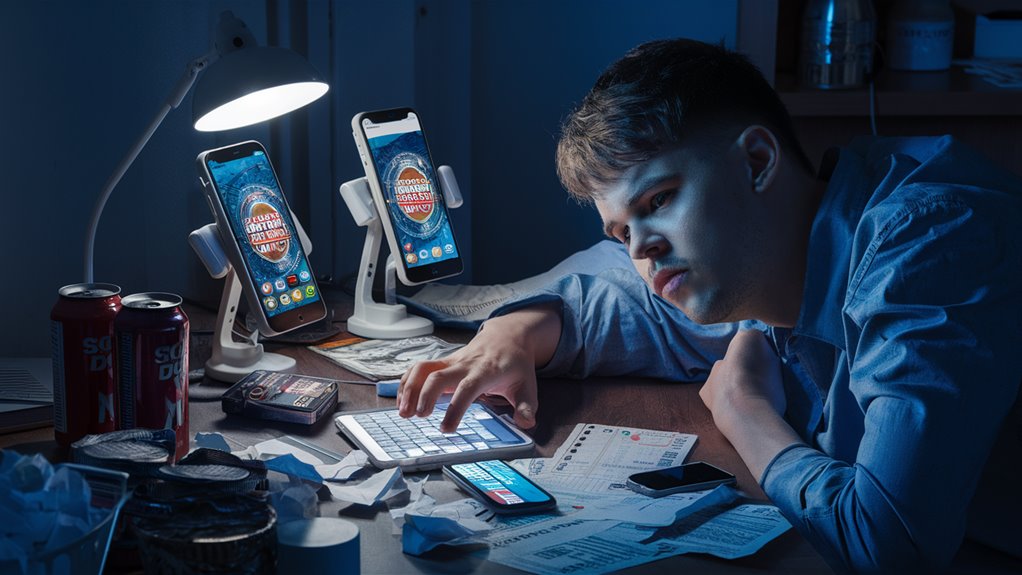
Let’s talk about how gambling companies are getting pretty clever with their social media game these days. You know how your social feeds seem to know exactly what you’re interested in?
Well, gambling operators have really upped their marketing game, using smart tech and data to figure out exactly who might be interested in placing a bet or two.
Think about the last time you scrolled through your social media. Did you notice those seemingly casual posts about sports betting or online casino games?
These companies are pretty sneaky about it, blending their marketing right into your everyday content. They’ve got influencers sharing betting tips, sponsored posts that look just like regular updates, and ads that feel more like friendly suggestions than sales pitches.
What’s really interesting is how they’ve turned gambling into something that feels more like social gaming. You might start with a free poker app or a virtual slot machine game, not realizing it’s actually a stepping stone to real-money gambling.
It’s kind of like how free samples at the grocery store get you interested in buying the full product.
These companies are really good at staying on your radar, too. Once you’ve shown even a tiny bit of interest, you’ll start seeing their content everywhere.
They’ll pop up in your stories, your feed, and even in the posts your friends share. And speaking of friends, these operators love it when you spread the word – that’s why they offer those tempting referral bonuses and loyalty rewards.
The whole thing is pretty sophisticated when you think about it. Instead of obvious gambling ads, you’re getting what looks like authentic content from people you trust or follow.
Before you know it, betting starts to feel like just another normal part of your social media experience, right alongside your friends’ vacation photos and funny cat videos.
Digital Peer Pressure and Betting
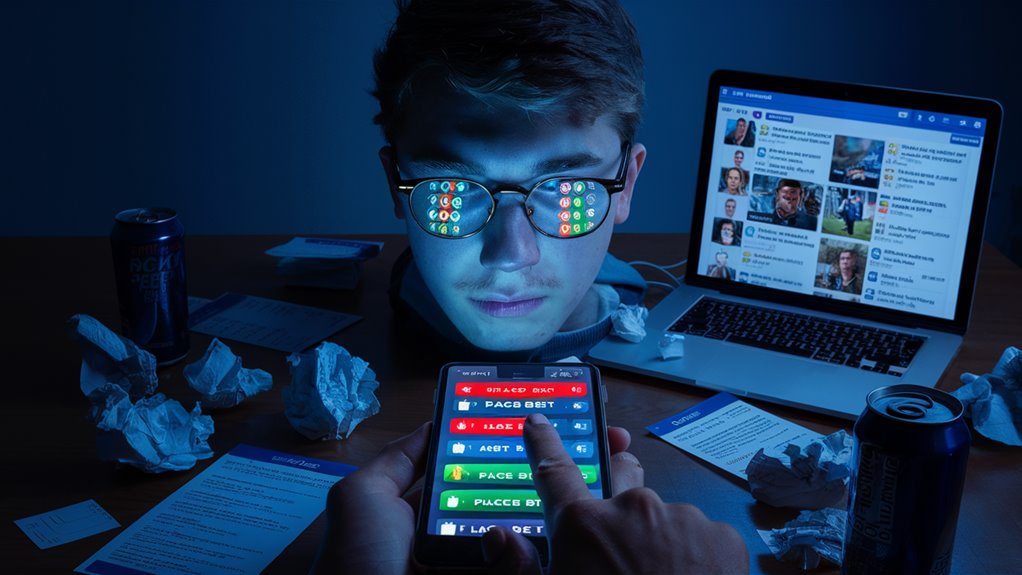
You know how social media has completely changed the way we interact with practically everything? Well, it’s definitely transformed how people think about and get into betting too.
Let’s be real – every time you open your social feeds, you’re probably bombarded with friends showing off their latest winning bets or sharing their “foolproof” betting strategies.
Think about it. Even if you’ve never placed a bet in your life, you’ll still catch glimpses of gambling content everywhere.
Maybe it’s your college buddy posting screenshots of their massive accumulator win, or that guy from work constantly sharing his “expert” predictions. It’s kind of wild how normal it all seems now, right?
The tricky part is when social pressure starts creeping in. Picture this: you’re watching the big game, and your group chat is buzzing with everyone talking about their live bets.
Someone tags you in a “can’t-miss” betting opportunity, or your friends are pushing you to join their fantasy league. It’s tough to stay on the sidelines when everyone seems to be having such a blast.
The whole FOMO thing hits differently with betting too. Social media makes gambling look like this fun, casual activity – just friends having a good time and maybe winning some cash.
But here’s the thing: between the celebratory posts and excited discussions, it’s super easy to lose sight of what responsible betting actually looks like. Kind of makes you wonder how many losing bets never make it to anyone’s timeline, doesn’t it?
Rise of Social Casino Games
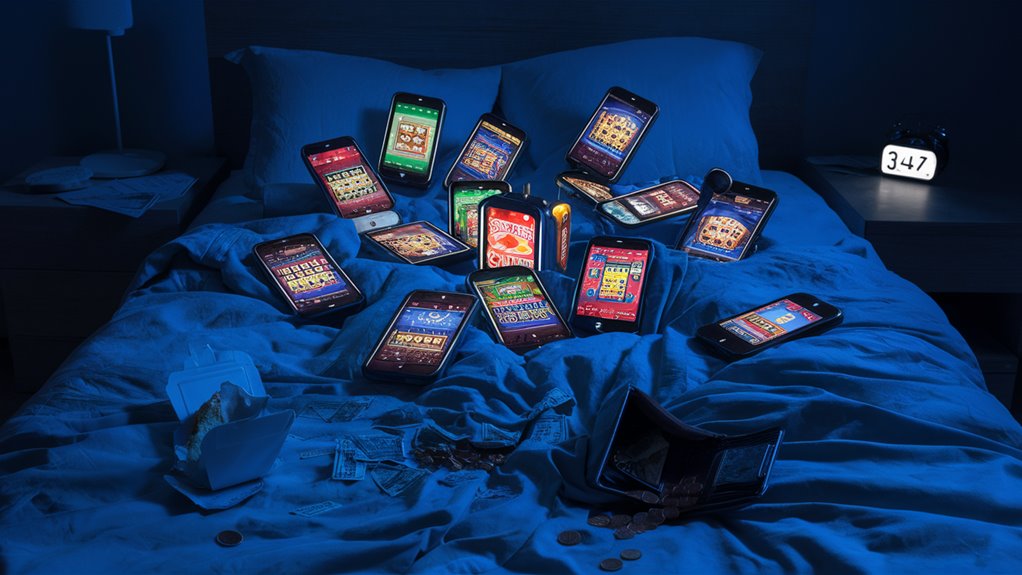
Have you noticed how social casino games have completely changed the way people get their gambling fix online?
These games are everywhere now – from Facebook to your phone’s app store, offering virtual versions of everything you’d find in a real casino, minus the actual money betting. Think of them as gambling’s digital cousins, operating in this interesting space where traditional gambling rules don’t quite apply.
You know what’s fascinating? These games are pretty clever in how they hook players.
They’ve got all the bells and whistles of real slot machines and poker tables – those exciting sounds when you win, flashy animations, and those moments when you just barely miss the jackpot.
Before you know it, you’re reaching for your wallet to buy more virtual coins when your free credits run out, even though you were just playing for fun.
The social aspect really takes these games to another level. Unlike sitting alone at a slot machine, you’re connected to friends and other players worldwide.
There’s something oddly compelling about sharing your big wins on Facebook or climbing those leaderboards. And here’s the thing – while you’re caught up in all this virtual excitement, real gambling sites are right there waiting with their ads, making that jump to actual betting feel like a natural next step.
It’s kind of like having a practice run at gambling, but with real emotions and sometimes real money spent on virtual coins.
The game developers know exactly what they’re doing, creating an experience that feels just like gambling without technically being gambling. Pretty sneaky, right?
Youth Gambling Through Social Platforms
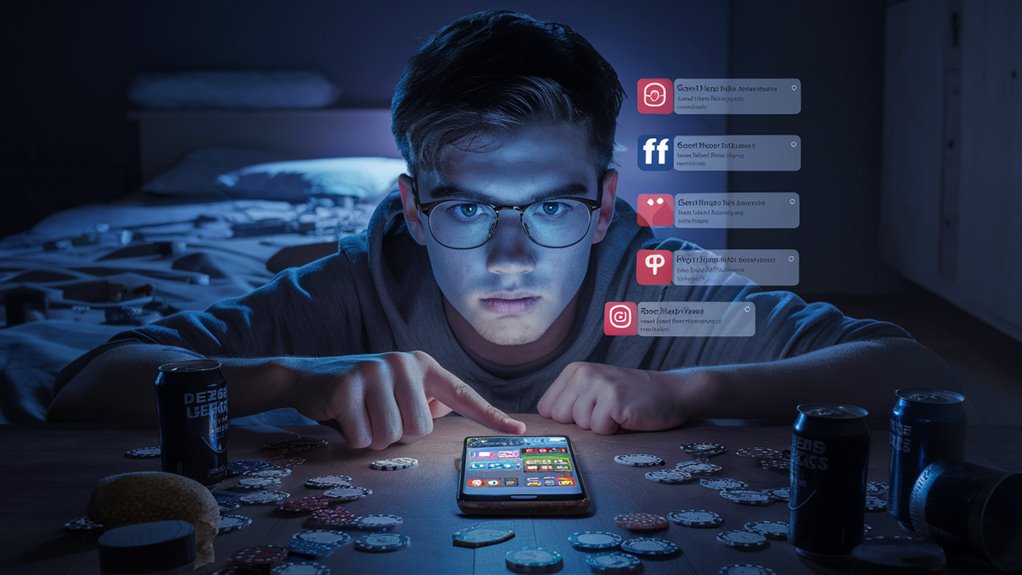
Let’s talk about something that’s become increasingly concerning – the way gambling has snuck into social media platforms, especially affecting our younger generation.
You know how kids these days seem glued to their phones? Well, what many parents don’t realize is that their children might be developing gambling habits without even knowing it.
Think about those colorful games popping up on Facebook or TikTok. They might look innocent enough, but many of them are actually teaching gambling behaviors through clever disguises.
Ever noticed those spinning wheels that give random rewards, or those mystery boxes that promise exciting prizes? That’s basically gambling 101 wrapped in a pretty package.
Social media has gotten pretty sneaky about this whole thing. Scroll through Instagram for a few minutes, and you’ll probably run into some influencer promoting a betting app or showing off their virtual casino wins.
The tricky part? These platforms are super smart about who they target, and young users often can’t tell the difference between harmless fun and potentially risky behavior.
What makes this even more complicated is how these platforms blend gaming and gambling so smoothly. Remember when games were just about beating levels or racing cars?
Now you’ve got loot boxes, virtual currencies, and all sorts of chance-based rewards mixed in. It’s like serving up a gambling appetizer to kids who are just looking to play games with their friends.
Want to stay safe? Start paying attention to these subtle gambling elements in your social media feed. Watch out for games that ask you to spend money on random chances or promise big rewards for small investments.
Better yet, talk to the young people in your life about recognizing these patterns. Sometimes the best defense is simply knowing what to look for.
Mobile Gaming and Accessibility
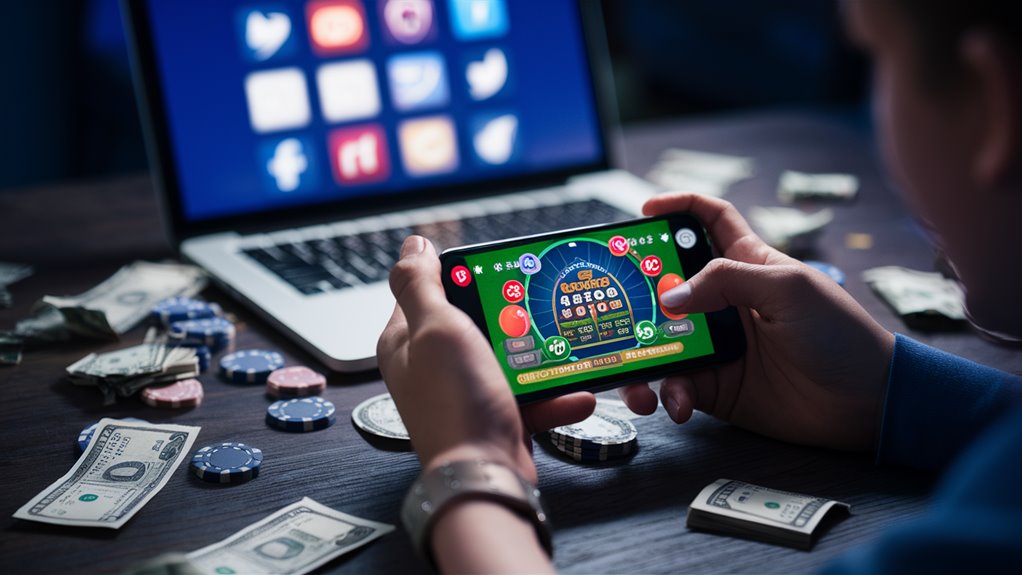
Let’s talk about how mobile devices have completely changed the way we interact with gambling. You know how gambling used to mean sitting at a computer or visiting a casino? Well, now it’s literally at our fingertips, available any time we want it.
Think about it – these days, you can pull out your phone and start playing poker, betting on sports, or trying your luck at slots while waiting for your coffee to brew. It’s pretty wild how simple it’s become.
Most gambling apps have made everything super streamlined – just tap your face to log in, hit a button to add money, and you’re off and running. If you’ve got Apple Pay or Google Pay set up, it’s even quicker.
But here’s the thing about having gambling in our pockets 24/7 – it’s not all sunshine and convenience. Have you ever felt that urge to place a quick bet just because you were bored?
Or maybe you’ve had a rough day and thought, “I’ll just try to win back what I lost real quick.” The constant accessibility can make these impulses harder to resist.
Plus, these apps are pretty clever with their notifications and special offers, always trying to pull us back in for another round.
The whole landscape of gambling has shifted with this mobile revolution. Between the slick technology and the always-on nature of our phones, we’re dealing with a completely different beast than what gambling used to be.
It’s convenient, sure, but it’s also something we need to be more mindful about than ever before.
Influencer Impact on Betting Behaviors
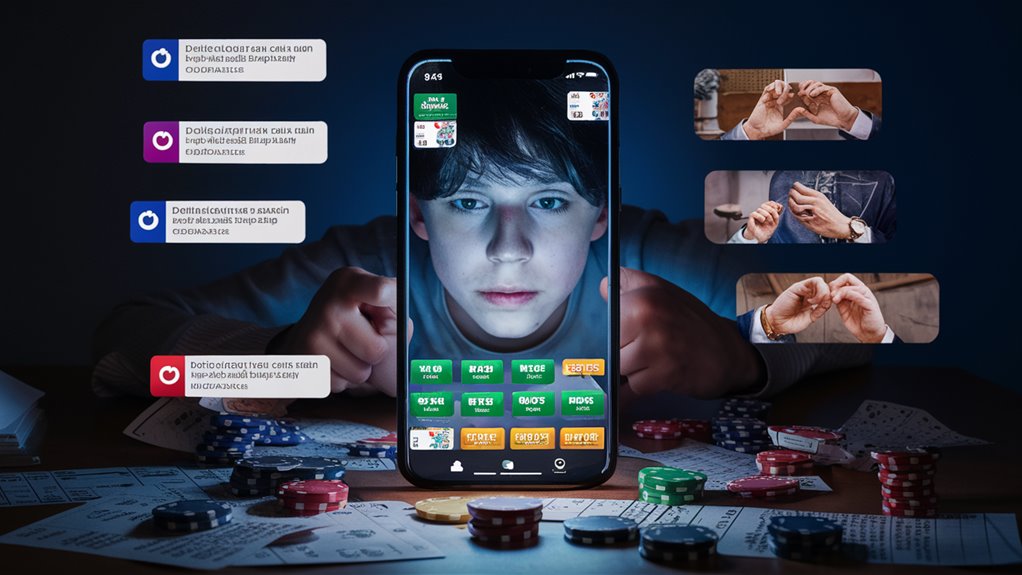
Let’s talk about how social media influencers are changing the betting game these days. You know how your favorite content creators always seem to be living their best lives? Well, many of them are now partnering with betting companies to make gambling look like just another cool lifestyle choice.
Think about what you typically see on your social feeds. There’s always that one influencer showing off their latest winning bet, right? They’re flashing screenshots of big payouts and dropping exclusive promo codes like they’re doing you a huge favor. But here’s the thing – what you’re not seeing is the full picture.
These content creators are pretty clever about how they present gambling. They’ll post stories about their amazing wins, share photos of fancy cars and luxury vacations, and make it seem like it all came from successful betting.
The reality? Most of their income actually comes from promotional deals with betting companies, not from gambling itself.
When you start following betting-focused influencers, you’re basically signing up for a constant stream of gambling content. Your feed fills up with betting tips, “can’t-miss” opportunities, and those tempting promotional offers.
It’s kind of like having a friend who won’t stop talking about their latest gambling adventure – except this friend is getting paid to convince you to bet.
The tricky part is that all this exposure starts to make gambling feel normal, even safe. But we need to remember something important: these influencers aren’t financial advisors looking out for your best interests. They’re marketers with a specific goal – getting you to sign up and place bets through their links.
Look, there’s nothing wrong with enjoying some casual betting, but it’s crucial to see through the glossy social media facade. Behind those perfectly edited posts and exciting stories lies a carefully crafted marketing strategy designed to make gambling as appealing as possible.
Social Media Gambling Regulations
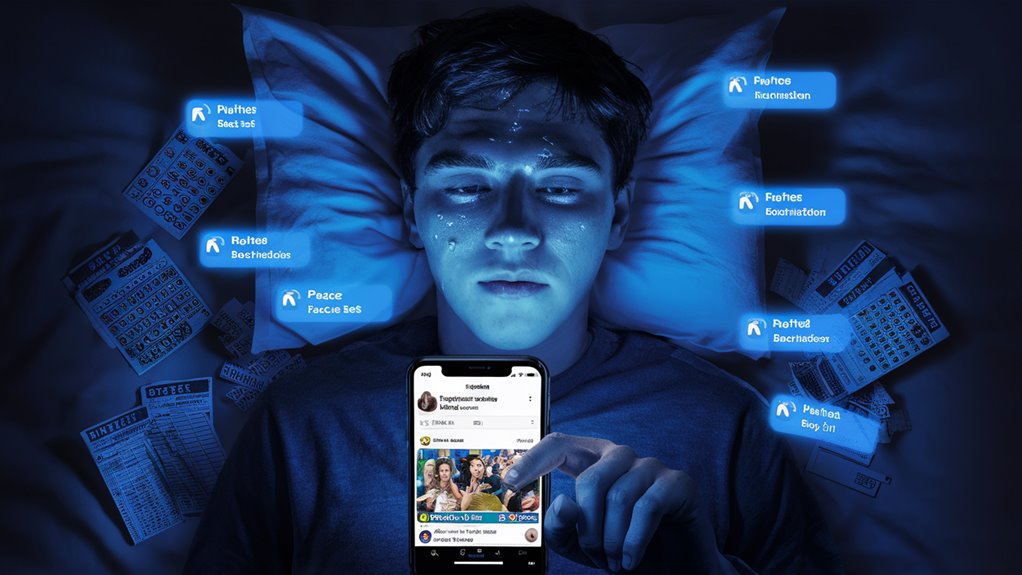
Let’s talk about how social media platforms handle gambling these days – it’s quite a maze to navigate, isn’t it? The rules vary so much between countries and platforms that it can make your head spin. If you’ve ever scrolled through Facebook, Instagram, or Twitter, you’ve probably noticed they each handle gambling content differently.
Think about it this way: in the US, it’s like having 50 different rulebooks, one for each state. You can’t just throw gambling ads out there and hope for the best. There are strict rules about keeping these ads away from teenagers, and you’ll always need those “please gamble responsibly” messages.
Now, if you hop across the pond to the UK, things get even tighter. The Gambling Commission there means business – they want to know exactly who’s seeing what, and they’re pretty serious about spelling out all the fine print.
What’s really interesting is how social media platforms are getting smarter about catching unauthorized gambling content. They’re using fancy AI systems that work kind of like digital bouncers, checking IDs and keeping an eye on who gets into gambling-related spaces online.
Planning to advertise? Well, you’ll need proper paperwork – licenses and certifications aren’t optional anymore. And here’s something new: platforms are starting to act like responsible bartenders, setting limits on how much time and money users can spend on gambling content.
It’s like having a friend tap you on the shoulder and say, “Maybe it’s time to take a break?” Pretty sensible when you think about how addictive this stuff can be.
Prevention and Digital Wellness
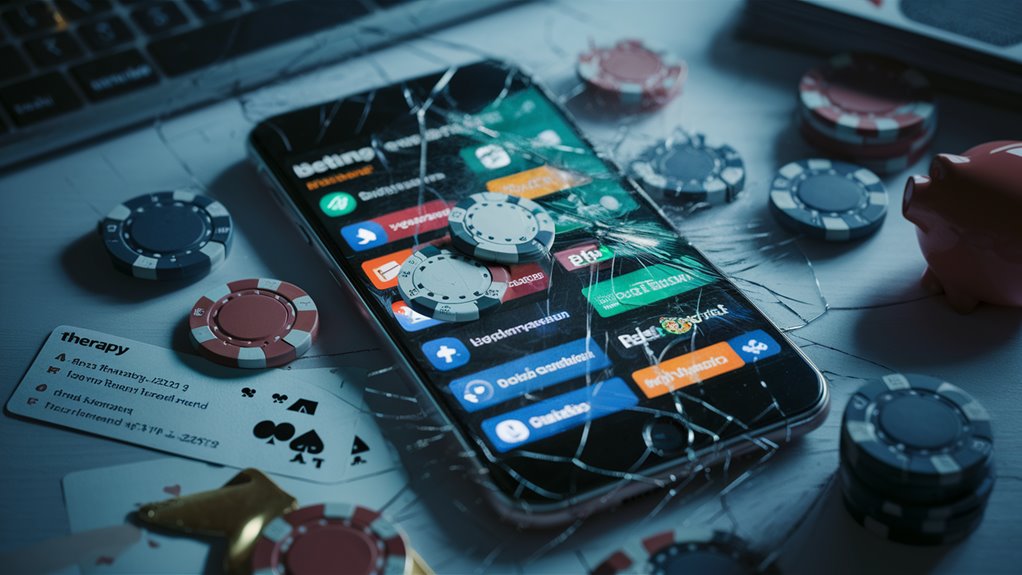
Let’s talk about protecting yourself from gambling influences on social media – it’s more important than ever in today’s digital world. You know how easy it’s to get caught up scrolling through feeds, right? Well, there are some practical steps you can take to create healthier online habits.
First up, getting control of your screen time is crucial. Think of it like setting boundaries with a friend who tends to overstay their welcome. Try setting reasonable daily limits for your social media apps and schedule regular breaks – maybe make Sunday your digital detox day. Pretty straightforward, right?
Now, about those pesky gambling ads and promotions. Social media platforms have some pretty useful content filtering tools that you can activate.
It’s kind of like having a bouncer who keeps unwanted guests out of your digital space. Block those gambling ads, promotional content, and those flashy gambling influencer accounts that pop up in your feed.
Building mindful social media habits is a game-changer. Start small – unfollow accounts that might trigger gambling urges, join some supportive online communities, and use apps that help you understand your social media patterns.
Think of it as spring cleaning for your digital life. While you’re at it, beef up your payment security by turning on two-factor authentication and setting spending limits on your connected accounts.
Want to take it a step further? Regular check-ups of your privacy settings can make a big difference. Keep an eye out for suspicious gambling content and don’t hesitate to report it.
There are also some really helpful browser extensions that can block gambling websites, and if you’re looking for extra support, try mental health apps that offer specific techniques for managing gambling triggers.
It’s like having a personal coach in your pocket, helping you stay on track with your digital wellness goals.
Common Questions
How Long Does It Take to Develop a Gambling Addiction Through Social Media?
Let’s talk about how quickly gambling addiction can develop through social media. You might be surprised to learn that it doesn’t take years – we’re actually looking at a matter of weeks or months in many cases.
Think of social media like a constant tap that’s always running. Every time you scroll through your feed, you’re exposed to gambling content, whether it’s sports betting ads, casino promotions, or friends sharing their wins. This steady drip of exposure can quickly turn into a flood of influence on your behavior.
What makes social media particularly tricky is how personalized everything becomes. Once you show even a slight interest in gambling content, the algorithms kick in. Before you know it, your feed is filled with targeted ads and suggestions that seem to know exactly what might tempt you. It’s like having a friend who keeps suggesting “just one more 도박문화 – except this friend never sleeps and knows your exact interests.
The accessibility factor is also huge here. In the past, you’d need to physically go to a casino or betting shop. Now? Well, you can place bets right from your couch while scrolling through Instagram or Facebook. This easy access, combined with constant exposure and targeted content, creates the perfect storm for rapid addiction development.
Can Social Media Gambling Debts Be Legally Forgiven or Discharged?
Let’s tackle a tricky question that many people face these days: what happens to those social media gambling debts? You know, the ones that pile up from online betting apps and social gaming platforms.
Well, here’s the reality – gambling debts are legally binding, no matter if you racked them up at a casino or through your favorite social media app. Think of it like any other financial obligation, whether it’s a credit card bill or a personal loan.
But there’s a bit of good news if you’re really struggling. Bankruptcy might be an option to help you get a fresh start. The thing is, though, it’s not quite as straightforward as it sounds. Different states have their own rules about how gambling debts are handled, and a lot depends on the type of debt and how it was accumulated.
For instance, if you used a credit card to fund your social media gambling, that’s treated differently than direct deposits or wire transfers. Some jurisdictions might be more lenient with social gaming debts compared to traditional casino losses.
Before you make any big decisions, it’s smart to chat with a legal professional who knows your local laws. They can help you understand your options and figure out the best path forward. Remember, the goal isn’t just to deal with the debt, but to also protect your financial future.
What Percentage of Social Media Gamblers Successfully Recover From Addiction?
Let’s talk about recovery rates among social media gamblers. You might be wondering what the chances are of breaking free from gambling addiction when social media platforms are involved.
The reality is that roughly 10-15% of people who struggle with social media gambling manage to achieve lasting recovery. Now, these numbers aren’t set in stone because, honestly, tracking recovery rates can be tricky. Many folks dealing with gambling problems keep it private, and some never seek professional help.
Think of it like trying to count fish in a large pond – you can only see the ones that surface. Similarly, we can only track the recovery stories of people who come forward or seek treatment. The actual success rate could be higher or lower, depending on several factors.
What really makes a difference? Well, having access to proper treatment programs is huge. Just as important is having a solid support system – family, friends, or support groups who understand what you’re going through. It’s kind of like having a team of cheerleaders in your corner, pushing you toward recovery.
Do Different Cultures Show Varying Susceptibility to Social Media Gambling Influences?
You know, it’s fascinating how different cultures respond to social media gambling. Let’s break this down in a way that makes sense. When we look at various societies around the world, we can see some pretty clear patterns in how people react to those tempting gambling ads and posts on their social feeds.
Think of it this way – in collectivist cultures, like many Asian and Middle Eastern societies, there’s often this built-in social buffer. People tend to consider how their actions affect their family and community before making decisions. It’s kind of like having a whole network of well-meaning relatives looking over your shoulder when you scroll through social media.
But flip the coin to more individualistic societies, like those in North America or Western Europe, and you’ll notice something quite different. These cultures often celebrate personal choices and achievement, which can make people more receptive to those flashy gambling promotions. It’s almost like having a green light to take risks because, well, it’s your life and your choice, right?
What’s really interesting is how social media amplifies these cultural differences. In collectivist societies, someone might scroll past a gambling ad thinking, “What would my family say?” while someone in an individualistic culture might see the same ad and think, “This could be my chance to win big!”
How Do Gambling Companies Track and Profile Social Media Users Across Platforms?
Ever wondered how gambling companies seem to know so much about your online activities? Well, it’s actually quite fascinating – and maybe a bit
